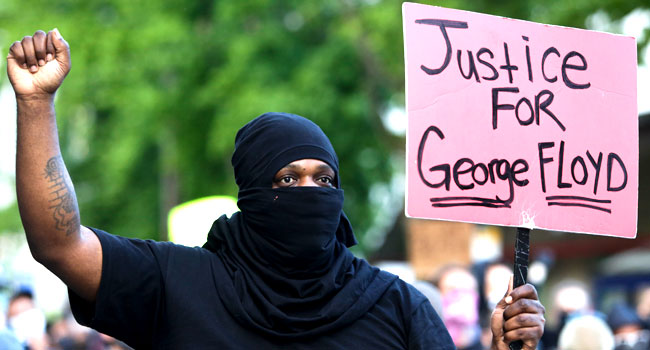
Former Minneapolis Police Officer Derek Chauvin was convicted Tuesday on all counts against him in the killing of George Floyd, nearly one year after kneeling on Floyd’s neck in an incident that sparked global protests against police brutality.
After less than 12 hours of deliberations, the jury returned guilty verdicts against Chauvin, finding him guilty of second-degree murder, third-degree murder and second-degree manslaughter in the death of Floyd on May 25, 2020.
Under Minnesota law, Chauvin can appeal his conviction after the court enters the judgment and he receives his sentence. Hennepin County Judge Peter Cahill said sentencing will take place in eight weeks. Chauvin’s bail was revoked and he was remanded to custody.
The verdict was met with applause from observers outside the courthouse. Minnesota Attorney General Keith Ellison, who led the prosecution of Chauvin, gave a press conference shortly after the verdict was read and praised the bystanders who testified at the trial.
“They performed simple, yet profound, acts of courage,” Ellison said. “They told the truth and they told the whole world the truth about what they saw.”
Jerry Blackwell, a member of the trial team, said that no verdict can bring Floyd back.
“But this verdict does give a message to his family, that he was somebody,” Blackwell said. That his life mattered. That all of our lives matter. And that’s important.”
Chauvin was accused of murdering Floyd by keeping his knee on Floyd’s neck — depriving Floyd of oxygen — during an arrest. Over the course of the 14-day trial, jurors heard from more than 40 witnesses from both the state and Chauvin’s defense team and viewed video footage from the incident, including that filmed by police body cameras.
Prosecutors argued throughout the trial that Chauvin kept his knee on Floyd’s neck despite Floyd’s cries for help and acted against Minneapolis Police Department policies when he restrained Floyd — an assertion that was supported by several high-ranking police officials who testified that Chauvin’s conduct was unnecessary and excessive.
“On May 25, 2020, Derek Chauvin put his knees upon [Floyd’s] neck and back, grinding and crushing him until the very breath, the very life, was squeezed out of him,” Blackwell told jurors on the first day of the trial. “You will learn what happened in that nine minutes and 29 seconds, the most important numbers you will hear at this trial.”
Medical experts testified for the state that Floyd died from a lack of oxygen in his body, with one expert saying his breathing was restricted so severely that it was almost as if a lung were removed.
Jurors also heard emotional testimony from the bystanders who witnessed Floyd’s death outside the Cup Foods convenience store and from people who knew him, including his girlfriend, Courteney Batay Ross, and his brother, Philonise.
Defense attorney Eric Nelson argued that Floyd died from multiple causes, not solely from Chauvin’s actions. Floyd had underlying heart disease and hypertension, Nelson said, and also had fentanyl and methamphetamine in his system, according to the autopsy from the Hennepin County medical examiner’s office. One medical expert for the defense said he wouldn’t classify Floyd’s death as a homicide, opting to instead deem it “undetermined,” due to the contributing factors in Floyd’s death.



